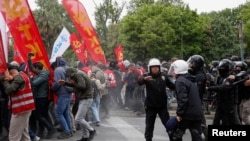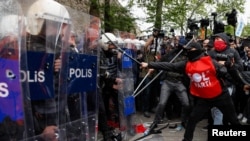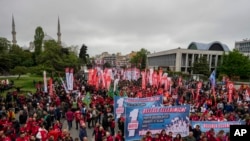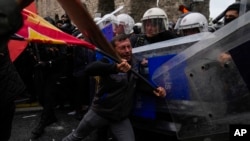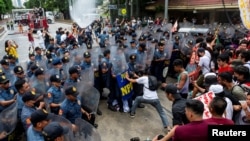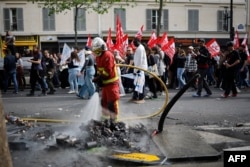Turkish police detained 210 people Wednesday during May Day demonstrations in Istanbul, said Interior Minister Ali Yerlikaya.
Activists took to the streets on May 1 to call for better working conditions and labor rights. Pro-Palestinian sentiments also were on display.
Yerlikaya said protesters refused to listen to warnings and that they attempted to walk to Istanbul's central Taksim Square and “attack” police officers. The government issued a ban on celebrations of International Workers’ Day in the area.
President Tayyip Erdogan said on the eve of May Day that demonstrators would not be permitted to rally in Taksim Square, which was cordoned off by police.
The ban violates the rights of Turks to organize public meetings and demonstrations, a right upheld by an October ruling from the Constitutional Court, according to legal experts.
Ozgur Ozel, the leader of Turkey's main opposition Republican People's Party (CHP) said the demonstration should be in Taksim Square.
"If May 1 is not celebrated in the country's main square, democracy is in trouble,” he said Wednesday in the district of Sarachane. “This struggle will continue until Taksim is free.”
Yerlikaya said more than 42,000 police officers were drafted for the demonstrations. Istanbul police fired rubber bullets and used tear gas on demonstrators. Thousands of people tried to breach the barricade to reach the square, some of whom threw stones at security forces.
At least 30 left-wing demonstrators were detained for trying to break through a separate blockade.
The government has declared Taksim off-limits for May Day demonstrations since 2013. But the square holds symbolic value for labor unions.
In 1977, unidentified gunmen opened fire and caused a stampede at a Taksim May Day celebration, killing 34 people.
A small group of trade union representatives was granted permission to enter the square to lay a wreath Wednesday in commemoration of the victims.
Elsewhere, thousands of demonstrators in Athens also took part in May Day marches, while related labor strikes disrupted Greece’s public transport.
May Day demonstrators in Iraq, Indonesia and the Philippines demanded increased wages.
Pro-Palestinian groups joined rallies in Greece, Lebanon and South Africa. They are expected to participate in marches in Paris alongside anti-Olympics activists.
The main unions in France filed a strike notice, warning that all sectors, including hospitals, will go on strike during the Games if the French government does not adequately compensate those forced to work during the summer holidays.
Some information for this report came from The Associated Press, Reuters, and Agence France-Presse.




